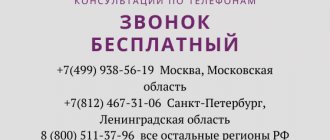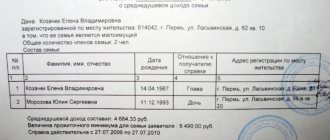Home / Family lawyer / Emergency social assistance in the Moscow region for a low-income family
Emergency social assistance, including repeated, is provided on the basis of an application for emergency social assistance provided at the place of residence of the person (persons) entitled to receive it to the territorial structural unit of the Ministry of Social Development of the Moscow Region or the MFC. If a family has been affected, the application may be submitted by one of the family members.
The application indicates the method of receiving emergency social assistance (transfer to an account opened with a credit institution; transfer to the account of the federal post office or through the cash desk of the territorial unit at the applicant’s place of residence).
a) passport or other document identifying the applicant in accordance with the legislation of the Russian Federation (original and copy for verification); b) an identification document of an adult family member of the applicant in accordance with the legislation of the Russian Federation; c) marriage certificate (divorce) (original and copy for verification); d) child’s birth certificate (original and copy for verification); e) a document confirming the place of residence in the Moscow region, issued by the registration authority (if this information is not contained in the identity document) (if not on hand, the MFC is requested); f) extracts from the house register, copies of a financial personal account or other document confirming the number of persons registered at the applicant’s place of residence (if not available, the MFC is requested).
- application for benefits;
- identification document of the applicant with a registration mark (passport);
- identification document of the second parent with a registration mark (if available);
- child’s birth certificate - if the registration of the civil status act was not carried out in Moscow before October 1, 2018, or by the competent authorities of foreign states;
- a document containing information about the applicant’s place of residence in the city of Moscow, if such information is not included in the applicant’s identity document;
- a document containing information about the place of residence of the second parent (if any), if such information is not included in the identity document of the second parent;
- a document confirming the child’s cohabitation with the parent in Moscow;
- certificate of establishment of paternity (if available) - if the registration of the civil status act was not carried out in Moscow before October 1, 2021 or by the competent authorities of foreign states;
- marriage certificate (if available) - if the civil status registration was made in Moscow before January 1, 1990 or not in Moscow before October 1, 2021, or by the competent authorities of foreign states;
- documents confirming the actual residence of the child in the city of Moscow (if one of the parents and (or) the child does not have a place of residence in Moscow: a certificate of the child’s education in an educational organization / a certificate of observation of the child in a medical organization;
- a document on the income of each family member for the 12 calendar months preceding 6 calendar months before the date of application for benefits;
- an extract from the work book or information about work activity, certified in the prescribed manner, an extract from a military ID or other document about the last place of work (service, study) - if available, in case of termination of work activity before January 1, 2021;
- a document confirming the absence of the second parent (in case of applying as an applicant as a single parent).
A certificate of assignment of social assistance is prepared by the department of social protection of the population of Moscow at the applicant’s place of residence within 14 working days. To receive a social scholarship, a completed certificate will need to be presented at the place of study.
How to get a social scholarship for students?
- application in accordance with the established form;
- passport or other identification document of a citizen containing information about the place of residence in the city of Moscow;
- a document containing information about circumstances that worsen or may worsen the living conditions of a citizen in order to recognize him as in need of social services;
- a certificate from a medical organization confirming the presence of diabetes mellitus if it is necessary to provide a diabetic food set (provided upon initial application);
- information about the income of the citizen and his family members for the last 12 calendar months preceding the application (with the exception of information about the amount of disability and (or) old age pensions, which are paid by a state institution - the branch of the Pension Fund of the Russian Federation for the city of Moscow and the Moscow region).
You might be interested ==> List of documents for a housing subsidy in the Krasnodar region for a large family
Urgent social assistance provides emergency assistance of a one-time nature, aimed at maintaining the life of citizens who find themselves in an extreme life situation that they cannot overcome on their own.
- providing free hot meals or food packages;
- provision of clothing, footwear and basic necessities;
- one-time provision of financial assistance;
- assistance in obtaining temporary housing;
- assistance in obtaining legal assistance in order to protect the rights and legitimate interests of a citizen;
- assistance in obtaining emergency psychological assistance with the involvement of psychologists and clergy in this work.
- families consisting of veterans of the Great Patriotic War, or veterans of the Great Patriotic War living alone, whose average per capita income, for reasons beyond their control, is below 200% of the cost of living for pensioners in the region.
Low-income residents of the Moscow region who are in difficult life situations can receive state social assistance in the form of payments. Funds are paid in a lump sum or periodically. Who is entitled to social assistance from the state and how to apply for it, read the material mosreg.ru.
— an extract from the house register or other document confirming the number of persons registered at the applicant’s place of residence or stay (if information about this is not in the municipality or MFC database);
People living in New Moscow are entitled to the same payments as residents of Moscow. In the capital, the insurance part is issued to those citizens who have at least 9 years of experience and from 11.4 points of the individual coefficient.
Federal law provides subsidies for large families in the form of reductions in monthly utility bills, child benefits, and payments to mothers (they are treated the same as workers and can receive 1 minimum wage until the youngest child turns 16). Also, families with 3 or more children can receive a plot of land on preferential terms for farming or building a country house.
How to get help for low-income families
Emergency social assistance is provided on the basis of an application for emergency social assistance and documents confirming the composition of the family, the income of family members (citizens) for the last three calendar months preceding the month of application, in the presence of a difficult life situation.
If a family has a small total income, then such families can receive low-income status. To calculate income, the average monthly wages and benefits of all family members for the last three months are taken. This amount is divided among all those included in it. If the resulting figure is less than the subsistence level for a given region, the family is considered low-income.
Social assistance for older people and its types
With age, people's physical capabilities decline. A decrease in many functions occurs due to diseases, and simply due to physiological reasons. That is why at this stage of life many people need government help.
The Civil Code of the Russian Federation specifies types of social assistance for older people, in particular:
- social assistance for elderly people at home;
- providing assistance in hospitals, as well as boarding schools and equivalent organizations (boarding houses, etc.);
- semi-stationary assistance for stay during daylight hours;
- urgent social assistance and support - one-time;
- prompt assistance in the form of consultations for people with disabilities.
For better adaptation of older people, specialized territorial centers operate in society. They were created directly to provide comprehensive social assistance to pensioners and disabled people. Their responsibilities include registering elderly people and ensuring that those in dire need receive assistance from the state in a timely manner. Territorial centers provide services based on the living conditions of the elderly and their pressing problems, which are solved on an individual basis.
Housing subsidy
The state provides assistance to low-income people to improve their living conditions. The subsidies apply to citizens of the Russian Federation. State programs are implemented by:
- Registration of those in need of improved housing conditions. Social housing for low-income people is provided from the state or municipal housing stock.
- Purchasing your own real estate or building a house using a social mortgage. It is distinguished by preferential interest rates, the presence of social guarantees, and the ability to pay the down payment or part of the loan using maternity capital. There are special programs that provide additional financing for repayment of a mortgage loan from budget funds. Thus, according to the “Young Family” program, up to 70% of the mortgage amount can be obtained from the state budget to pay for the cost of purchased housing. In 2021, low-income citizens will be issued mortgages for construction or finished housing at 6%, the rest of the interest will be covered from budget funds.
To register, you should contact local authorities, write an application and provide the following documents:
- passport of adult citizens;
- children's birth certificate;
- Marriage certificate;
- certificate of absence of residential property;
- certificate of family composition;
- income certificate.
The decision is made within a month, but before making it, the living conditions are examined by a commission. Mostly housing subsidies for low-income people are provided in the form of a certificate. To obtain housing in this way, you should follow the following algorithm:
- open a bank account for crediting certificate funds;
- choose residential real estate (when purchasing from a developer, its readiness must be more than 70%);
- draw up a purchase and sale agreement;
- provide an agreement to the bank to transfer funds to the seller;
- take a receipt from the seller about the receipt of money, draw up an act of acceptance and transfer of real estate;
- register property;
- provide a certificate of registration to the housing stock.
Conditions of receipt
Article 49 of the Housing Code of the Russian Federation states the right of low-income citizens to free priority housing. According to Article 51 of the Housing Code of the Russian Federation, citizens are recognized as in need of improved housing conditions and are registered for the allocation of social housing on the following grounds:
- There are no residential property owners or social housing tenants among family members.
- The premises in which low-income citizens live are unsuitable for habitation and are in disrepair.
- One of the family members is seriously ill.
- Several families live in one room (apartment, house).
- Owned or rented housing does not meet established standards. According to the law, 1 person is entitled to at least 18 square meters. m of living space.
- Urticaria in children - causes and symptoms. Types, treatment and diet at home
- Is it possible to eat pomegranate if you have diabetes?
- Cupcake in a slow cooker - recipes with photos. How to make cottage cheese, lemon or banana cake
What laws have been adopted regarding older people and providing them with social assistance at home?
Currently, there are a number of legislative acts regulating social assistance for elderly citizens and disabled people.
Let's list them:
- Federal Law of the Russian Federation “On State Social Assistance” dated July 17, 1999 No. 178-FZ (latest edition).
- Decree of the President of the Russian Federation “On additional measures to improve the living conditions of elderly citizens and disabled people in state and municipal stationary and semi-stationary social service institutions” dated December 25, 2000 No. 2063.
What is social assistance at home?
Following the Civil Code of the Russian Federation, social support for elderly citizens can be provided for the purpose of:
- improving the quality of life and recreation of older people;
- purchasing food, medicine, essential goods, etc.;
- providing various types of services and help around the home (for example, delivery of drinking water, lighting the stove (in the absence of central heating and running water);
- putting housing in order, including feasible repairs of premises in an apartment or private house;
- assistance in paying for utilities, accompanying you to a local doctor, on a walk, on a trip to a sanatorium or dispensary;
- calling a specialist of a narrow medical specialty to your home if necessary.
Many pensioners, being on disability, cannot fully take care of themselves; even the simplest hygiene procedures are difficult for them and become an impossible task. The duty of social workers is to help such people, to make their life as comfortable as possible. To do this, a specialist from the social assistance service at home must:
- offer your services to call a doctor;
- perform all necessary hygiene procedures required by the ward;
- provide assistance in undergoing a medical examination and medical and social examination;
- accompany a sick elderly person to a medical facility to receive professional medical care.
Among other things, social workers are often asked for help in legal matters, collecting certificates, obtaining papers, restoring documents, etc.
Who exactly is provided with social assistance at home?
Social service employees take under their care:
- women over 55 years old; — men over 60 years old;
Specialists must unconditionally fulfill their duties in relation to older people who really need outside help. Social assistance at home is intended for citizens who cannot care for themselves.
A conclusion on the provision of such assistance to pensioners is issued on the basis of an examination by a special commission. When considering a case, the commission may render a verdict of “refusing” to receive social assistance at home. The refusal may be based on:
- mental illness that poses a danger to the life of the social employee;
- abuse of alcoholic beverages;
- drug use;
- diseases related to quarantine, as well as venereal diseases;
- diagnosis of tuberculosis and the like, which are treated in closed institutions.
Often, social services are unable to provide assistance in a timely manner due to the heavy workload of their workers or due to the fact that the applied pensioner does not have a specific place of residence. The issue of placing an elderly citizen in special institutions where he will receive assistance in treatment or provision of permanent residence is resolved in court. Such issues are resolved without the involvement of the judiciary - if the person is single or by agreement with relatives. Also, this right can be used by disabled people with impaired motor functions and limited self-care.
What is SHG and who is eligible for it?
State assistance on the basis of a social contract is not provided just like that - the recipient of this support measure must report on what he spent the funds allocated to him on. For example, if money was given to buy medicine for a child or for training courses, you need to confirm that the medicine was actually bought and that classes were not skipped.
What documents are needed to obtain SHG
The size and scope of state social security assistance for the poor is established by regional authorities. For example, in the Moscow region, the amount of payments for each family member cannot exceed 6,000 rubles per year. In the Tver region, the size of SHG depends on the number of children in the family. If there are no children, they will give no more than 40 thousand rubles, if there are no more than 2 children, 100 thousand rubles, and if there are more than 3, 150 thousand.
If one of the family members or all family members do not work without a good reason and are not registered with the employment service, they are not recognized as low-income. If at the same time they lead an asocial lifestyle, then they will not be given help either.
Low-income - a family whose average per capita income does not exceed the subsistence level in the region. The issue of assigning and paying benefits to low-income families is regulated by Law No. 44-FZ dated April 5, 2003. Not every low-income family is considered low-income. Photo: hollivizor.ru
Why do the poor in the regions pay little, but in Moscow do they pay a lot?
We sum up all the income for three months and get 149,253. Now we divide this value by three and get the average monthly total family income - 49,751 (compare how the amount has changed due to the one-time bonus). Divide by all family members 49751/5, we get 9950.
May 11, 2021 semeiadvo 228
Share this post
- Related Posts
- Regional payments in the Stavropol Territory for up to 3 years to low-income families from 2021
- St. Petersburg train ticket price for pensioners
- What is required at the birth of 3 children in 2021 in the Udmurt Republic
- Increasing benefits for labor veterans in 2021 in the Stavropol Territory
What documents are required
At the center you must fill out a standard application according to the established template. If necessary, a social service worker helps with this. Then the elderly person seeking help must bring the following documents:
- passport (original and copy);
- registration statement (issued by the passport office at the place of residence);
- disability certificate or other document confirming the right to social benefits. help;
- a medical certificate of health (certified by the head physician of the medical institution) and a rehabilitation program, if there is one;
- a power of attorney for the person who is involved in processing social assistance in the event that the person in need is unable to do so;
- a certificate of income that is subject to taxes (if the pensioner has such in addition to the pension).
Collecting all the documents seems simple, but in practice it is not always possible to quickly obtain social assistance at home. In addition, in territorial centers there is a constant shortage of personnel, consideration of applications is delayed or is not always considered on the merits of the issue. And disabled people and elderly citizens cannot wait, so they (or their relatives) often turn to a boarding house in the Odintsovo district for the elderly with round-the-clock supervision and individual care for the elderly. As a rule, in such institutions, work with older people is organized at a high level, all conditions for comfortable living are created; There is a staff of medical workers looking after elderly patients.
Benefits for large families in 2021 in the Moscow region
Issued after the birth of the 2nd and subsequent children. Amount 100 thousand rubles. You can apply through the MFC, but you can only receive the certificate in person at the social security office. The expenditure of funds is similar to the federal certificate - improvement of living conditions, education, etc.
Social protection of the Moscow region payments to low-income families
At the same time, the number of children being raised by the spouses does not matter. According to statistical calculations, the status of the poor is often acquired by large families, adoptive parents or guardians, single parents and persons raising a disabled child.
It all depends on what kind of benefit is required. For example, privileges for baby food are issued by Social Security, as well as free travel or compensation for utilities. If we are talking about tax breaks, you must contact the Federal Tax Service.
- passports of family members over 18 years of age;
- birth certificates of children (if they are under 14 years old);
- a certificate confirming earnings for the last 90 days;
- declaration in form 3-NDFL for the last 3 months (for entrepreneurs);
- certificate of availability of alimony payments;
- certificate of the amount of the scholarship;
- work books;
- a certificate confirming registration with the Center for Significance;
- ITU conclusion on the determination of disability;
- documentation confirming the right to use living space;
- TIN (parents and children);
- bank account details. Required if a citizen requests the appointment of preferences.
What payments can you receive if you have a certificate of low income?
Each region independently adjusts and supplements existing social programs. All payments to preferential categories and low-income couples are based on the size of local budgets. Therefore, in the Moscow region, low-income families can receive additional compensation and benefits.
You might be interested ==> Scholarship at MSSU Moscow for a nonresident student living in the Chernobyl zone where to apply
For example, the Ivanovs from Bryansk have two children. The father’s salary is 20 thousand rubles, and the mother’s is 15 thousand rubles. Total income for three months is 105 thousand rubles. The average per capita income for each family member is (105,000 / 3) / 4 = 8,750 rubles. Since the cost of living per capita in the Bryansk region for the first quarter of 2021 is 10,537 rubles, a family can enter into a social contract.
Procedure for paperwork
After the elderly person submits all documents to the social security service, his application is considered by the commission within 10 days after submission. If the commission makes a positive decision, an individual assistance program is created, designed for a specific pensioner, who is assigned his own social worker. After the commission's approval, a contract is drawn up. It prescribes all types of social assistance that are planned to be provided to the elderly citizen under his care. An agreement for receiving social assistance is the main document regulating the rights and obligations of the parties. Namely, the elderly person (or his authorized representative) and the social service. Valid for the entire current year, coming into force from the date of signing. The contract is automatically renewed for the next year: it does not need to be re-issued. The social worker makes visits to his ward daily or several times a week, depending on the elderly person’s health condition. The frequency is determined by the actual well-being of the disabled person.






